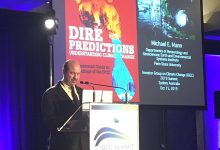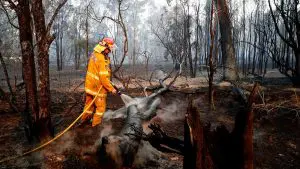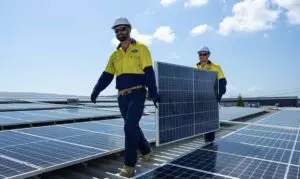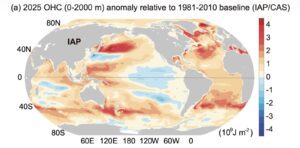One of the world’s leading climate scientists has warned investors of the difficulties of trying to predict the financial implications of climate change tipping points, and labelled the denial of climate change science as ‘villainous’.
Michael E. Mann is the Director of the Earth System Science Centre at Pennsylvania State University and has been a leading figure in climate science and understanding how global temperatures have evolved throughout human history.
Speaking to the IGCC Summit in Sydney, Professor Mann labelled corporate climate change denial as ‘villainous’ and ‘immoral’, and added that climate scientists had an important role in informing the public discussion about climate change.
“Acts of defamation and attacks on scientists, those may be offensive and inappropriate on a personal level, but climate change denial writ large is fundamentally villainous, because it is imperilling future generations,” Mann told the summit on Tuesday.
“It’s imperilling all of us now and it is putting our children and grandchildren at great risk. It is arguably one of the most immoral of modern corporate PR campaigns. The campaign to deny the reality and threat of climate change.”
Investors have been grappling with how to predict and plan for the impacts of climate change, including insurance companies who see a world of 4 degrees or more of global warming as effectively uninsurable. Professor Mann warned investors that simplistic models of future climate change impacted economies may not present an accurate picture of the risk posed to investments.
“Uncertainty is not our friend. We have to weigh on the side of assessing a potentially far greater risk than some of the simple linear models that are used might suggest. We really need to be thinking about the possibility that the impacts could be far greater than the models that are usually used to assess impacts and to assess risk,” Mann said.
Professor Mann said that the possible physical impacts of climate change were hard to predict, as it was difficult to model how the climate might respond to ‘tipping points’ that fundamentally changed the Earth’s weather systems, and which made it virtually impossible to predict the financial implications of possible future events like the collapse of the Greenland ice sheet.
“One of the things that we worry about is as we warm the planet beyond on certain thresholds, we will set in motion a potential tipping point responses, Irreversible responses,” Mann told the summit. “Even if we could somehow magically cool the planet back down, we wouldn’t be able to stop these things from happening.”
“In some cases the costs are effectively infinite, collapse the Greenland and West Antarctic ice sheets, and we get 20 plus feet of sea-level rise, that’s an absolutely catastrophic impact that is uninsurable.”
Mann expressed optimism about recent campaigns for climate action, particularly the emergence of a strong movement among young people and students, who have emphasised how climate change is fundamentally a moral challenge.
“Youth climate strikes around the world have shifted this conversation now. From simply a conversation about science and policy and economics to what it truly is. This is a matter of intergenerational ethics and preserving the planet for our children and grandchildren for future generations,” he said.
Professor Mann has been the at the centre of several legal challenges and has successfully taken on climate change deniers in defamation actions and hopes to spend more time in Australia during a sabbatical challenging climate change deniers and opponents to climate action.
“Because of the attacks against me, I found myself in a position to actually influence the larger conversation. And ultimately I’ve embraced that opportunity,” Mann said.
“It’s part of why I’m here right now, right down in Australia, and will be here for a sabbatical early next year to try to take on some of those same forces of denial or delay that we’re dealing with the United States here in Australia.”







